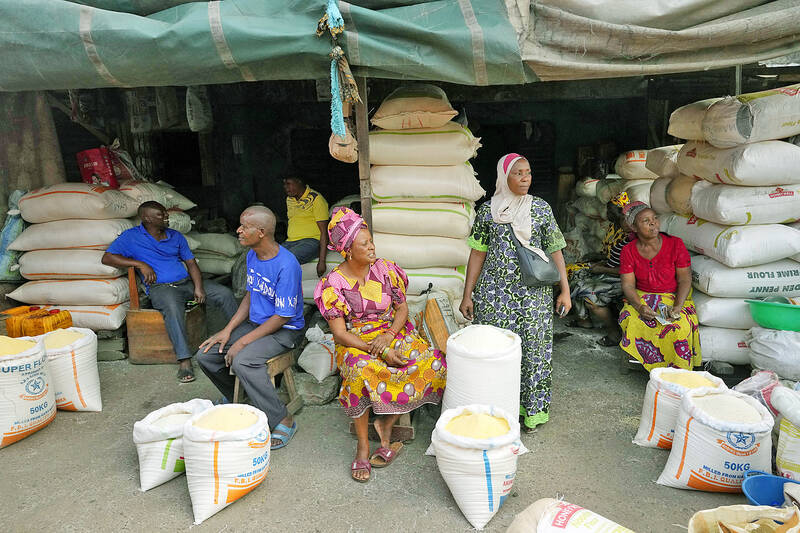Nigeria’s cocoa exports are coming under threat from a shortfall of cash to pay laborers and transporters, further straining global supply.
The country’s central bank in October last year announced it would redesign 200, 500 and 1,000-naira notes in a bid to mop up excess cash and rein in inflation.
As much as 2.1 trillion naira (US$4.61 billion) has been returned to banks, and the policy has led to a severe shortage of bills as people have been unable to get new notes after depositing their old denominations.

Photo: AP
For the cash-dominated cocoa industry, the crunch has left farmers unable to hire workers and exporters without money to get the crop to ships.
The world’s fifth-largest producer of the chocolate ingredient risks not being able to ship as much as 27,000 tonnes this month, Cocoa Association of Nigeria president Mufutau Abolarinwa said on Wednesday.
“We don’t have a quantum of the new notes now to pay for all the services like grading fees, handling charges, freight and some other sundry charges — all of which we usually pay in cash,” Abolarinwa said.
The situation could further compound the supply concerns that have lifted London cocoa prices to a six-year high.
Futures surged more than 6 percent this week amid reports of bean shortages in top grower Ivory Coast, fueling worries that some exporters there might default on contracts.
Upcoming cocoa plantings might also be disrupted as landowners cannot get enough cash to cover workers’ daily wages, spurring a shortage of farmhands to clear and weed farms, said Atangba Bonjor, a cocoa farmer in Ikom in southeastern Nigeria.
Nigeria’s cocoa exports have already slumped as poor weather and fungal issues hampered the main-crop harvest. The country shipped 33,176 tonnes in December last year, while last month’s export figures have not been released.
The cash shortfall is affecting fresh deliveries, said Isaac Arayela, a manager at the Ile-Ife Cooperative Produce Marketing Union, a cocoa-farmer organization.
“We have no cash to pay our members for their cocoa supplies and they won’t accept bank transfers,” Arayela said.
Up to 500 tonnes of the union’s produce is stuck in warehouses, he said.
Many exporters are suspending activities due to the challenges, said Kunle Ayoade, managing director of Agrotraders Ltd, a cocoa exporting company.
Shippers often pay 100 naira per bag to laborers who load the beans on trucks bound for ports and an additional 100 naira to unload them on ships. Truck drivers are also paid in cash.
“Staff spend hours in bank queues to obtain cash, which in most cases is not available,” Ayoade said.
In other commodities:
‧ Gold for April delivery fell US$1.60 to US$1,850.20 an ounce, down 1.29 percent from the previous week.
‧ Silver for March delivery rose US$0.01 to US$21.72 an ounce, but was down 1.63 for the week.
‧ March copper fell US$0.03 to US$4.11 a pound, but was up 2.24 percent weekly.
Additional reporting by AP

To many, Tatu City on the outskirts of Nairobi looks like a success. The first city entirely built by a private company to be operational in east Africa, with about 25,000 people living and working there, it accounts for about two-thirds of all foreign investment in Kenya. Its low-tax status has attracted more than 100 businesses including Heineken, coffee brand Dormans, and the biggest call-center and cold-chain transport firms in the region. However, to some local politicians, Tatu City has looked more like a target for extortion. A parade of governors have demanded land worth millions of dollars in exchange

Hong Kong authorities ramped up sales of the local dollar as the greenback’s slide threatened the foreign-exchange peg. The Hong Kong Monetary Authority (HKMA) sold a record HK$60.5 billion (US$7.8 billion) of the city’s currency, according to an alert sent on its Bloomberg page yesterday in Asia, after it tested the upper end of its trading band. That added to the HK$56.1 billion of sales versus the greenback since Friday. The rapid intervention signals efforts from the city’s authorities to limit the local currency’s moves within its HK$7.75 to HK$7.85 per US dollar trading band. Heavy sales of the local dollar by

Taiwan Semiconductor Manufacturing Co’s (TSMC, 台積電) revenue jumped 48 percent last month, underscoring how electronics firms scrambled to acquire essential components before global tariffs took effect. The main chipmaker for Apple Inc and Nvidia Corp reported monthly sales of NT$349.6 billion (US$11.6 billion). That compares with the average analysts’ estimate for a 38 percent rise in second-quarter revenue. US President Donald Trump’s trade war is prompting economists to retool GDP forecasts worldwide, casting doubt over the outlook for everything from iPhone demand to computing and datacenter construction. However, TSMC — a barometer for global tech spending given its central role in the

An Indonesian animated movie is smashing regional box office records and could be set for wider success as it prepares to open beyond the Southeast Asian archipelago’s silver screens. Jumbo — a film based on the adventures of main character, Don, a large orphaned Indonesian boy facing bullying at school — last month became the highest-grossing Southeast Asian animated film, raking in more than US$8 million. Released at the end of March to coincide with the Eid holidays after the Islamic fasting month of Ramadan, the movie has hit 8 million ticket sales, the third-highest in Indonesian cinema history, Film